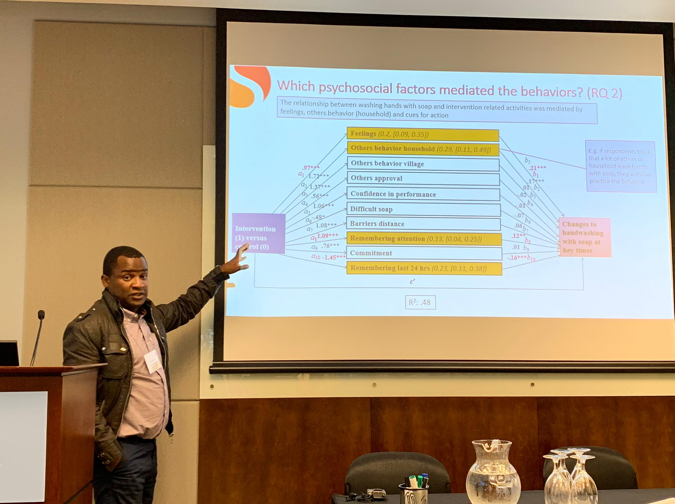Conference reflections from SHARE Research Fellows: Kondwani Chidziwisano

Our SHARE Research Fellows had a busy year in 2019 attending conferences. Two key conferences were UNC Water and Health and the American Society of Tropical Medicine and Hygiene Annual Meeting. In this series of blogs, the Research Fellows share their experiences of the conferences. Kondwani Chidziwisano, SHARE Research Fellow from Malawi, attended the ‘2019 UNC Water and Health: Where Science Meets Policy’ conference that was held from 7 – 11 October at Chapel Hill, North Carolina. Here he reflects on the proceedings of the conference.
The well attended conference brought together WASH experts from the academia, government, donor agencies and Non-Governmental Organizations (NGOs) who came from all corners of the world. Specifically, 649 delegates from 41 different countries presented/attended 60 side events, 128 verbal presentations and 146 poster presentations. Thus, the conference created an interface to interact with fellow WASH practitioners and provided an opportunity for future collaborations. Indeed, the conference provided a platform for networking amongst researchers, policy makers and programme implementers. Of particular interest was that the conference delegates discussed important issues on how to improve WASH practices at household, community and institution level in both the developing and developed worlds.
Organized by the Water Institute at UNC, it was remarkable that the conference covered all aspects of WASH that included drinking water supply, sanitation, hygiene and water resources under the following key themes:
- Humanitarian WASH
- WASH Financing and market
- Climate Variability and Water Security
- Evidence Based WASH
- WASH and Environmental Health
The food hygiene session
Out of the numerous interesting sessions organised during the 5 day conference, one focused on food hygiene. This is the session where I made my presentation and there were also other presenters from the SHARE Research consortium. One key reflection was that despite food being an important parameter to child health, it still remains a neglected area among researchers and programme implementers.
The first to present was Dr. Jane Mumma from Great Lakes University of Kisumu, who gave an insight on the potential pathogens responsible for food contamination in peri urban areas of Kenya. She was delighted to highlight on the need to continue conducting research that should result in identification of simple, scalable interventions to completely remove pathogens from household environments.
The next presentation was given by Dr. Tracy Morse from the University of Strathclyde and University of Malawi (Polytechnic – WASHTED). It focused on the primary outcome of the food hygiene intervention study conducted in rural Malawi (i.e. the Hygienic Family study). Tracy highlighted the effectiveness of the study – which led to a reduction in diarrhoeal prevalence among children aged five years and below. In addition, she gave an insight on how the intervention was developed. The full package detailing the designing of the intervention can be accessed here and the intervention training materials are available upon request. Dr. Morse further emphasised the need for researchers and programme implementers to understand the local context before rolling out new WASH interventions in an area.
Later, I was glad to speak about the behaviour change component of the Hygienic Family intervention earlier introduced by Dr. Morse. I focused on the key behaviours targeted by the intervention. I gave an insight on how activities of the intervention were framed and implemented to address the problematic behavioural factors identified by the formative research. I further highlighted on the need for existing national WASH and Nutrition programmes to (e.g. Community Led Total Sanitation (CLTS) and Scaling Up Nutrition (SUN)) to integrate specific food hygiene behaviors promoted by the Hygienic Family intervention study.
Existing evidence on WASH for Nutrition: Implications for programming and policy
Oliver Cumming from LSTHM chaired this side event where participants discussed on how to ensure that there is uptake of research findings and translation of evidence into policy and practice. Delegates also discussed on how practitioners should take an active role in informing research. The event gave an opportunity to the audience to brainstorm on how to influence policy with evidence-based research.
